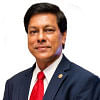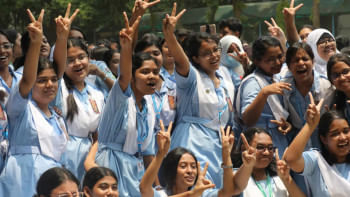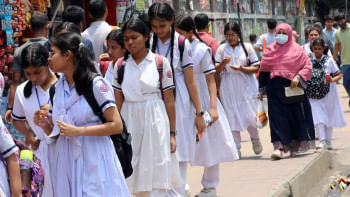We are not taking care of our young generation

Recently, the Bangladesh Youth Leadership Centre (BYLC) and Brac University's Centre for Peace and Justice conducted a joint survey involving 5,609 young individuals aged 16-35 from various parts of the country to gauge their perspectives on education, health, livelihoods, justice, climate change, migration, democracy and governance. The findings indicate that 55.3 percent perceive Bangladesh to lack peace, 71.5 percent feel uncomfortable expressing their views publicly, and 68.6 percent feel that the current education system fails to adequately prepare them for employment or entrepreneurship. Moreover, nearly 89 percent cited corruption, along with unemployment (67 percent), inflation (51 percent), and climate change (73 percent), as adversely impacting their well-being. Similarly, a 2020 World Economic Forum study uncovered that 82 percent of individuals aged 15-29 expressed a desire to migrate from Bangladesh due to socioeconomic concerns.
These reports raise the question as to why our youth struggle with such feelings of frustration, insecurity, detachment, apathy, and disillusionment, especially when they belong to a generation known for its potential to drive change. Several factors contribute to these sentiments and shed light on the underlying causes.
One significant factor behind young people's feeling of disillusionment is the pervasive corruption committed by businessmen, politicians, government officials, and influential figures, among others. When politicians engage in activities like election-rigging, nepotism or bribery, when prominent business leaders evade taxes or commit loan fraud, and when influential individuals manipulate public tenders or get involved in illicit activities like drug trafficking or extortion, the repercussions are felt throughout society.
Often, these corrupt individuals go unpunished, eroding trust in the system, which is particularly disheartening for the youth who dream of a brighter future and a more equitable society, and perceive these incidents as a betrayal of their aspirations for good governance. Moreover, today's political landscape lacks fundamental principles like reconciliation, tolerance, honesty, and respect for human dignity and differing beliefs. Instead of addressing crucial issues like economic development, health and education, politicians resort to criticising and verbally attacking each other with flimsy arguments and offensive language, lacking healthy debates or discussions on matters directly affecting citizens' lives.
Furthermore, political parties are exploiting the youth for their own gains. Student politics was once a domain for the brightest and socially conscious students to engage in and contribute to national affairs. Now it has been hijacked by non-student actors, who manipulate young people as pawns to advance their political agendas. Student politics, once a beacon of idealism, has become tainted by partisan interests, power struggles, and greed for wealth. Consequently, the younger generation is increasingly feeling disinterested and apathetic towards the country's politics and politicians. Recent events, such as the resistance to partisan student politics at Bangladesh University of Engineering and Technology (Buet) is a case in point.
The economic growth and development that we take pride in regrettably bypassed the majority of the population, benefiting mainly the higher-income groups. The Household Income and Expenditure Survey (HIES) 2022, conducted by the Bangladesh Bureau of Statistics (BBS), reveals a widening rich-poor gap in income distribution within the country. Shockingly, the report indicates that 30.04 percent of Bangladesh's income is concentrated within the top five percent of households. Moreover, this economic growth has not only exacerbated income inequality, it failed to generate sufficient employment opportunities for the millions of young Bangladeshis entering the workforce annually. According to the 2022 Bangladesh Sample Vital Statistics report, approximately 41 percent of the nation's youth are inactive, meaning they are not studying, working or receiving any job training. While many are trying for employment, experts argue that they are not getting the necessary support from the system, as approximately 87 percent of them are engaged in informal employment.
What's even more alarming is that, as a society, we have inadvertently set the wrong standards for the generations following ours. Our society that once used to value morals and ethics has now become superficial and lost its moral compass. Values such as honesty, trust, integrity, respect and tolerance of others' opinions no longer play an important role in our daily lives. The concept of value has shifted, and it is now determined by price rather than the intrinsic quality of things. Morality, a term that traditionally conveys a sense of virtue, seems to be more applicable to those who are perceived as weak and fragile within the community. Sadly, our definition of "success" has evolved; today, it's predominantly equated with monetary wealth, irrespective of its legality. As a result, many young individuals find themselves struggling with the fundamental question of discerning "right" from "wrong." Besides, many talented young people opt to leave the country at the earliest opportunity, which could seriously hurt the nation's long-term growth and prosperity.
The total population of Bangladesh stands at 169.8 million, of which 27.96 percent are between the age of 15 and 29 years. These young people represent the future of our nation. Social scientists emphasise that a nation that does not take care of its youth is a doomed nation. Therefore, the government and the entire society should focus on harnessing and utilising the energy, passion, and spirit of the youth through positive means to engage them fully in the economic and social sectors to build the leaders of tomorrow.
Abu Afsarul Haider is an entrepreneur. He can be reached at [email protected].
Views expressed in this article are the authors' own.
Follow The Daily Star Opinion on Facebook for the latest opinions, commentaries and analyses by experts and professionals. To contribute your article or letter to The Daily Star Opinion, see our guidelines for submission.

 For all latest news, follow The Daily Star's Google News channel.
For all latest news, follow The Daily Star's Google News channel. 










Comments